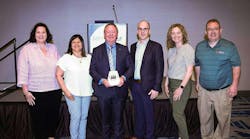Wow, it's 2011 and while the new year has just begun, the wheels of trucks continue to roll across this country year after year. As an industry, we are faced with new regulations and rulemakings, from hours of service to CSA, and inevitably, the regulatory pipeline will be filled with more issues in the coming years. By the time this column lands on your desk, your already-busy safety department will even have to consider that the new Congress will be discussing future trucking issues such as a broader mandate for electronic onboard recorders (EOBRs) and a new highway bill.
Traditionally, at the beginning of every year, safety departments rededicate themselves to identifying areas of weakness that affected their operations the previous year. With CSA, this job can definitely become an easier task than before; however, what continues to remain difficult are the ways to change, fix and improve the weak areas once they are identified. As a fleet owner or manager, you should be challenging your personnel to develop innovative new ideas to address your carrier's weaknesses.
In the world of trucking safety, fleets deal with the same problems year after year and repeatedly try the same tired methods in hopes of fixing those problems. This is the dawn of a new era in trucking technology, and innovative ideas are at the forefront of our industry. Does your fleet have a logging issue or find itself deficient in the hours-of-service BASIC score? If so, you should begin adopting or testing EOBRs and train drivers to use them. Are you finding a trend in rollover accidents? Look to anti-rollover technology. These may seem like obvious solutions, but in this age of technology, don't be afraid to test out new ways to save lives and money.
In theory, issuing the challenge to develop new ideas is easy. Coming up with a fresh approach to an old issue is more difficult. Encourage your safety department to rely on their industry peers to help with the process. The long-standing adage that “there are no secrets in safety” holds as true now as before, so encourage chatter among your safety people to rely on their colleagues. It is time to become more active in your state or national association's safety divisions and to find the answers to address problems within your fleet. Safety personnel, whether employed by a competing carrier or not, are all dedicated to the greater safety good, which, in trucking, equals saving lives on our nation's roadways.
In the interest of improving your own safety record and using all of the tools at your disposal, including your fellow transportation professionals, I also encourage each of you to spread the word when you find an innovative way to resolve an issue. Write to me and I will do my best to pass the information along. There are no secrets in safety, and it's up to you and your colleagues to spread the word on positive solutions that would certainly have an impact on other fleets. It's a new year and a new challenge, so I look forward to hearing some of the new, innovative ways you are solving age-old problems.
Best of luck in 2011.
David Heller, CDS, is director of safety and policy for the Truckload Carriers Assn. He is responsible for interpreting and communicating industry-related regulations and legislation to the membership of TCA. Send comments to [email protected].


